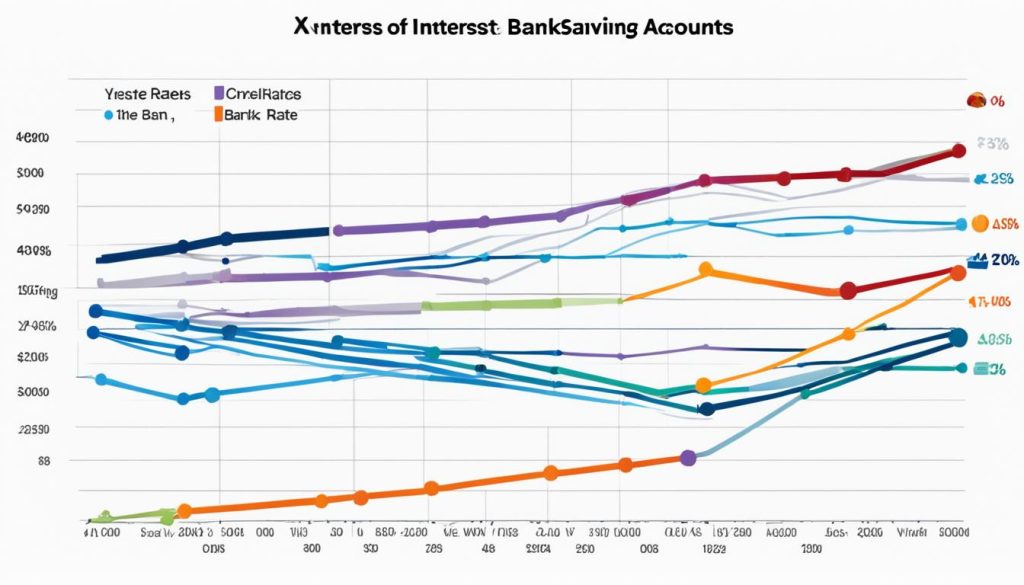The UK’s banking sector is a key part of its economy. It is as changing as it is strong. It offers many financial services, like saving money and helping businesses grow. This system adapts to what customers need today and the complex global economy.
It’s important to understand how this system works. This knowledge helps whether you’re saving money or running a business. The UK’s finance and banking have lots of chances and hurdles.
Overview of the UK Financial System

Exploring the UK’s financial history takes you on a fascinating journey. It reveals how past and present have shaped today’s finance industry. British finance began with early banks and now plays a key role in the world economy. Let’s dive into the roots and modern setup of this sector, seeing its impact on the economy and daily life.
Historical Development of British Banking
The story of British banking is vital to the country’s economic tale. It started with goldsmiths and led to the creation of the Bank of England in 1694. This journey through revolutions and wars brought change and growth to the sector.
Current Financial Landscape
The UK’s financial services are known for their resilience and creativity. Alongside traditional banks, investment banks thrive, supported by FinTech innovations. These elements together build a robust and adaptable industry, ready to meet societal needs.
- Heritage British banks continue providing security and trust built over generations.
- Globe-spanning investment banks and financial service providers endorse the UK as a global finance nexus.
- FinTech firms introduce agility and innovation, disrupting conventional models and pushing the industry forward.
Regulatory Framework in the UK’s Finance Sector

The UK’s financial regulation stands strong, thanks to the Financial Conduct Authority (FCA). With Brexit causing significant changes, the role of the FCA is now more crucial than ever. It ensures the finance sector remains solid and adaptable.
The Role of the Financial Conduct Authority (FCA)
The FCA keeps a watchful eye on the UK’s finance scene. It protects consumers, keeps financial markets stable, and encourages fair competition. It oversees banks, credit unions, and insurance companies, aiming for transparency and cutting down financial crimes. This helps keep consumer trust and safety high.
Impact of Brexit on Financial Regulation
Brexit has led to big changes in financial rules, posing challenges. Losing passporting rights was a major blow, forcing a rethink of how to work across borders. The UK is now working on new deals to keep its global financial relations strong. It’s also focusing on making its financial rules fit better for its own needs.
- Investigating shifts in data sharing norms and compliance requisites for UK financial institutions post-Brexit
- Adapting to changes in regulatory cooperation between the FCA and its international counterparts
- Protecting London’s status as a pre-eminent financial hub through strategic regulatory adaptations
Banks and Building Societies

UK retail banks and building societies are key to our high street banking. They offer many financial services to people nationwide. With a long history of trust and tradition, they’ve moved into the digital age. They stay vital for daily finance and the wider economy.
British building societies focus on their customers. They are different because they are mutual organisations. This means customers help make decisions. They mainly offer savings and mortgages.
On the other hand, UK retail banks offer a wider variety of services. They have everything from current accounts to investments. With their big branch networks, they meet a wide range of needs.
Despite changes from technology and customer habits, high street banking remains strong. Banks and building societies have upgraded digitally. They have online platforms and mobile apps. Yet, they keep their physical branches for those who like banking in person.
With the digital shift, UK banks and building societies still play crucial roles:
- Providing accessible customer service both online and offline.
- They offer advice and products that understand local markets well.
- Keeping strong security measures to protect client assets.
- They support economic stability and growth with their services.
Despite challenges and advancements in technology, UK banks and building societies stand as pillars of reliable high street banking. They adapt to what their customers need and want.
Challenges Facing UK Banking Industry

The UK banking industry is facing changes head-on. The shift towards digital banking is more than a trend; it’s now a reality changing the game. Banks are under big pressure to update how they work because of new technology. Clients now expect more convenient and efficient services, pushing banks to think again about their plans. This is due to the challenge from fast-moving FinTech companies in the UK.
Technological Advancements and Digital Banking
Customers’ banking habits have changed thanks to digital banking innovations. With online transactions, instant updates, and mobile apps, customers get a better experience. To keep up and remain relevant, banks are boosting their digital services. This is crucial in the tough competition within the banking industry.
- Online and mobile banking platforms that provide user-friendly interfaces.
- Personalised digital services utilising data analytics and AI.
- Automated processes for loans, account services, and financial advice.
Banks are shifting towards digital offerings to keep their customers. They are changing how they operate to include digital tools in their services.
Competition from FinTech and Challenger Banks
The rise of the UK FinTech sector offers customers more choices beyond traditional banks. Challenger banks use modern tech, letting them quickly meet customer needs and introduce new products. This means more competition for the usual banks as these new players take a slice of the market.
- Adoption of blockchain technologies for secure, transparent transactions.
- Introduction of no-fee accounts that attract cost-sensitive customers.
- Use of cutting-edge tech to offer superior rates on savings and loans.
Older banks need to refresh what they offer or work with FinTech firms to stay in the game.
By embracing innovation and forming strategic partnerships, the UK banking sector is tackling its challenges. Despite the obstacles, these moves could completely change what financial services mean for everyday people.
Investment Banking and the City of London

London is a top global finance center. It’s known for its mix of history, innovation, and financial skill. The city boasts some of the top UK investment banks. These banks are important for the British economy and the world’s financial markets.
Key Players in the UK Investment Banking Sector
A few investment banks in the UK are very big. Banks like Barclays and HSBC are known around the world. They handle complex deals for big companies and governments.
- Barclays – With its headquarters etched into the London skyline, it represents a linchpin in both UK and global investment banking.
- HSBC – Not only a fixture in personal banking, but HSBC also commands a formidable position in the corporate and investment banking sectors.
- Standard Chartered – Focused on wealth management and institutional banking, carving a distinct niche in the market.
London’s Role in International Finance
London is a huge part of global finance. It attracts professionals and institutions that affect markets worldwide. Its advanced rules and skilled workers make it key in global finance. The city adapts well, even to big changes like Brexit. This helps maintain its strong role in finance.
- A sterling regulatory framework that prioritises transparency and accountability, attracting global players.
- An extensive talent pool, with professionals adept in cutting-edge financial instruments and strategies.
- Infrastucture optimised for high-stakes financial activities and constant innovation.
The Importance of the Bank of England

The Bank of England is the central bank for the UK. It is crucial for keeping the economy stable and setting monetary policy. It plays a big role in keeping the nation’s finances healthy and the economy running smoothly.
Maintaining Monetary Stability
The Bank of England is vital in the UK’s economic health. It sets interest rates to manage inflation and issues banknotes. It helps make sure that the economy is predictable, so everyone can make solid plans for the future.
- Interest Rates: The Bank adjusts interest rates to influence the economy’s borrowing and spending.
- Inflation Targeting: It sets inflation goals to keep the currency’s value stable.
- Asset Purchases: Sometimes, the Bank buys assets to put more money into the economy, known as quantitative easing.
Bank of England’s Response to Economic Crises
Throughout history, the Bank of England has been strong and flexible during tough times. It has faced the 2008 financial crisis, Brexit, and the COVID-19 pandemic. The Bank’s decisions have been key in keeping the country’s financial system stable.
- Quantitative Easing: The Bank uses quantitative easing to boost the economy during recessions.
- Interest Rate Adjustments: It changes interest rates to promote investment and spending during downturns.
- Lender of Last Resort: The Bank helps banks in trouble by providing them with emergency funds. This prevents the financial system from crashing.
Retail Banking Services and Consumer Trends
The UK consumer banking scene is always changing. It’s focusing on following retail banking trends. This includes offering personal finance services for a variety of customer needs. Banking has moved from the high street into the digital space. This has changed how people use banking services.
Online and mobile banking services are now more popular than ever. This is changing how customers act. They want to access their banking services all the time and manage their money quickly. Banks are improving their digital services to meet these needs. They aim to provide a better experience online.
- Convenient mobile apps to manage accounts on-the-go
- Online-only banks offering competitive rates and fees
- Instant payment features and contactless transactions
- Personal budgeting and financial planning tools
- Enhanced security measures to protect customer data
Also, retail banking trends are showing a move towards personalisation. Banks use data analytics and AI to learn about customer habits. They then offer products that suit each customer’s financial goals better.
- Custom interest rates for savings accounts based on customer profiles
- Personalised loan and mortgage offers
- Targeted insurance packages in partnership with financial advisors
- Reward programs and incentives linked to customer spending behaviour
In a competitive market, UK consumer banking is bringing in new personal finance services. This includes education in banking apps. This helps consumers make smarter financial choices. It shows banks are adopting new ways to keep and attract customers.
In conclusion, it’s vital for retail banks to follow these trends closely. They need to serve the changing needs of UK consumers. Successful banks will be those offering convenience, flexibility, and a personal touch. They should have a wide range of financial products and services.
Finance and Banking in the UK: A Guide

Choosing the right financial service in the UK can feel overwhelming. There are many types of bank advice out there. It’s vital to learn well before making choices about your money. This guide helps you pick the right banking services for your personal or business needs. It also explains UK bank account fees clearly.
Choosing the Right Banking Services
Finding the right banking service requires aligning it with your financial goals. Here’s how to simplify the selection process:
- Examine your financial habits – Decide if you need a current, savings, or another type of account.
- Look at availability – Some prefer online services while others might want branch access. Choose what works best for you.
- Check for perks – Some accounts offer benefits like overdrafts, better interest rates, or rewards schemes. See what appeals to you.
Make sure your choice matches your needs, convenience, and how you plan to grow your money.
Understanding UK Banking Fees and Charges
It’s essential to know about various bank fees in the UK. Let’s look at the common ones:
- Monthly account fees – Some accounts charge a fee each month for extra services.
- Overdraft charges – If you use an overdraft, be aware of the interest or daily fees.
- Transaction costs – Watch out for fees on foreign card use or certain transfers.
- ATM fees – Using machines not from your bank may lead to charges.
Being clear on fees helps you pick the best service and steer clear of unexpected costs. This can help keep your finances on track.
For solid banking advice in the UK, always read the details and ask questions. Your financial health depends on making informed decisions.
Savings and Investment Options in the UK

Planning your finances well is key to securing and growing your money. The UK offers many ways to save and invest wisely. Here, we’ll guide you through choosing the right savings accounts and investments to meet your finance goals.
Comparison of Savings Accounts
In the UK, savings accounts are essential for managing your money. They range from easy-access accounts to fixed-rate bonds. Each has its own pros and cons, affecting interest rates and how you can use your funds.
- Instant Access Savings Accounts: Perfect for those needing quick access to their money while still earning interest.
- Fixed-Rate Savings Bonds: Great for people who can set aside their savings for a certain period, earning more interest.
- ISAs (Individual Savings Accounts): These accounts don’t tax your savings, but there’s a limit to how much you can save each year.
- Regular Savings Accounts: Best for those who can save a set amount every month, possibly earning more interest for consistent saving.
Popular Investment Vehicles
When looking into investments, it’s smart to weigh the risks against possible returns. A mixed bag of investments can lower risk and increase growth potential over time.
- Stocks & Shares: High returns are possible here, but the risk is greater.
- Bonds: These are usually steadier, making them less risky than stocks.
- Mutual Funds: This lets you invest in many assets, handled by experts.
- Property Investment: Real estate can bring in rent and go up in value over the years.
To plan your finances well, explore UK savings and investment options carefully. Always do your homework or speak to a financial advisor. This way, you can make choices that fit your unique financial situation best.
Emerging Technologies in UK Finance

The UK financial scene is always changing, with tech innovations leading the way. In the digital age, blockchain and artificial intelligence (AI) are changing old financial ways. They create new chances and make things more efficient.
Blockchain and Cryptocurrency
Blockchain technology in banking is starting a big change. It brings more openness, safety, and efficiency. Cryptocurrencies are key in this change, challenging the usual ways we see money. In the UK, experts are closely looking at how blockchain can change transactions. They also make sure it follows the rules.
- In-depth analysis of blockchain’s application in securing transactions and reducing fraud.
- Evaluation of how cryptocurrencies are being integrated into mainstream finance.
- Discussion on the regulatory approaches to these new technologies within the UK’s financial ecosystem.
The Future of AI in Banking and Finance
AI is changing financial services in big ways. It can look through huge amounts of data. This means better financial advice, risk checks, and spotting fraud. The UK finance world is using AI more. This is to make things automatic, improve service for customers, and handle investments with smart algorithms.
- Exploration of AI-driven customer service improvements for a more tailored banking experience.
- Insight into how AI technologies are driving advancements in financial analysis and decision-making.
- Projection of AI’s role in future finance, from intelligent automation to predictive banking behaviours.
UK Banking for International Clients and Expatriates
For those living abroad or moving to the United Kingdom, it’s vital to grasp UK’s banking scene. It caters to students, professionals, and retirees. This ensures smooth financial dealings across countries.
Expatriates enrich the UK’s diverse community. They need specialised banking solutions. Many banks offer services suited for international needs, covering savings, earnings, or investments.
Opening Accounts and Financial Planning
Opening a bank account is the first step for new clients. It can be easy with some groundwork. Banks understand the unique needs of expatriates and guide them through it:
- Identification Verification – A passport or another photo ID usually proves who you are.
- Proof of Address – A utility bill or tenancy agreement often shows you live in the UK.
- Credit Checks – Some banks check your credit history for eligibility.
- Financial Advising – Banks also provide advice to help live and save money abroad.
While details may differ across banks, these are key steps for a smooth UK banking start.
Navigating Cross-Border Banking
Handling money in more than one country needs a smart plan. Here’s how:
- Understand the Fees – Know about charges for international transfers.
- Exchange Rates – Watch out for currency changes that impact your money.
- Regulatory Environment – Learn the financial laws in your home and the UK.
- Digital Solutions – Use online tools to easily manage funds while abroad.
With a clear strategy, moving to the UK can be easier financially. Expert advice and modern banking make staying economically stable abroad possible.
Conclusion
We have explored the UK’s financial world and found key insights. These insights help both individuals and businesses with the British banking system. We noticed the strong rules, new tech, and banking plans that keep the sector strong. This shows us a financial world that can handle new challenges and meet different needs.
It’s important to choose the right banking strategies today. With old banks and new FinTechs together, people need to understand their options. Knowing about the different financial services lets customers pick what suits them best. Also, with the UK’s economy changing, it’s vital to understand the market. This helps in grabbing opportunities and avoiding risks.
We’ve looked at the big moments in British banking and what might come after Brexit. These details help with making smart choices and planning. As the UK moves forward in the world of finance, being informed and adaptable is crucial. Step into the future confidently, with a good grasp of the finance and banking sector in the UK.
















